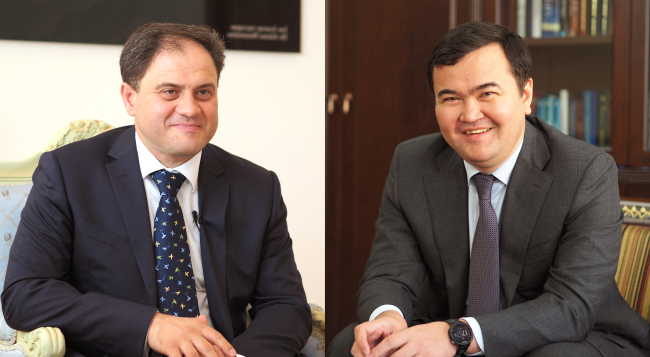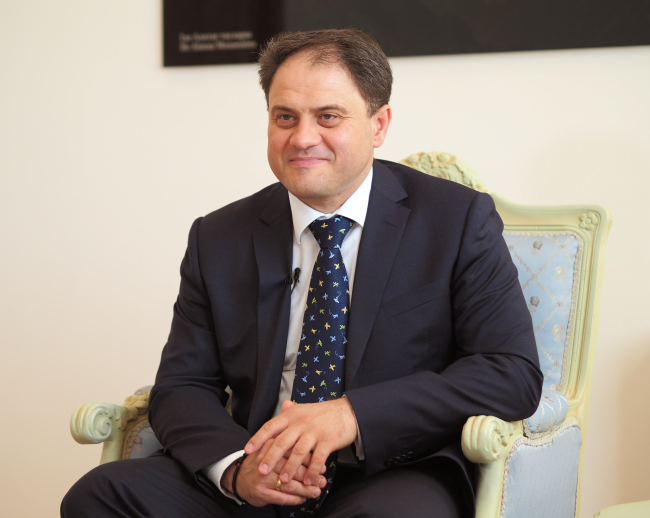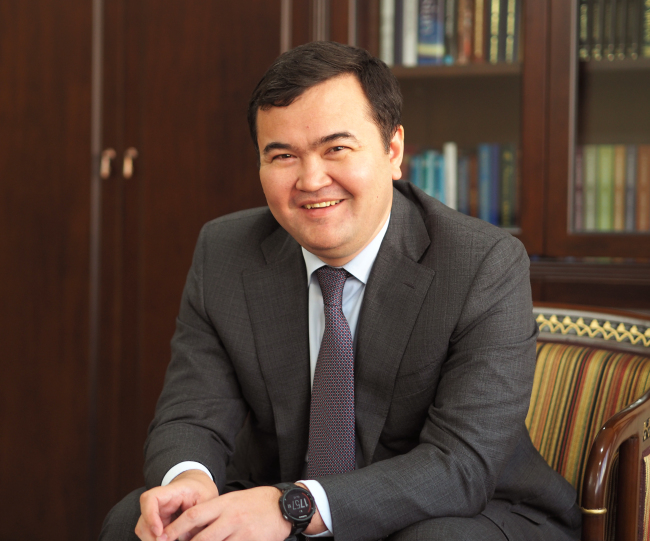ASTANA, Kazakhstan -- Central Asia, a region long insulated from globalization and liberalization, is awakening from its centuries-old slumber. By embracing international integration and enhancing commercial environs, the region is harnessing harmonious winds of change blowing across Europe and Asia.
Kazakhstan is leading the five Central Asian nations in their collective quest for global engagement and national development, according to the country’s Deputy Foreign Minister Roman Vassilenko.
“Central Asia is a region where we are seeing many positive changes, and the political environment and relations among our states have improved dramatically,” Vassilenko told The Korea Herald and other media outlets in an interview in Astana in June. “We are now seeing a revival of constructive relations that will help us tackle the challenges we all face, namely extremism, fundamentalism and terrorism, as well as the sustainable sharing of water resources.”
There is a common understanding among the countries -- Kazakhstan, Kirgizstan, Tajikistan, Turkmenistan and Uzbekistan -- that Kazakhstan represents their voices through the United Nations Security Council, where it has a nonpermanent seat from 2017-18, he explained.
Pointing to security problems stemming from terrorism-saturated Afghanistan, the diplomat said the Central Asian states are jointly discussing ways to root out the seeds of destruction, which was not the case before.
 |
Kazakhstani Deputy Foreign Minister Roman Vassilenko (left) and Kazakhstani Minister of Investment and Development Zhenis Kassymbek at their offices in Astana, Kazakhstan (Joel Lee/The Korea Herald) |
“We now have a regional approach to security and development issues, and speak with our collective voice,” he said, adding Astana strives to draw the international community’s attention to Central Asia and Afghanistan, where “the precarious security situation is of paramount importance.”
Kazakhstan approaches Afghanistan-related issues through the “prism of mutually reinforcing security and development,” the envoy explained, referring to the “security-development nexus,” where security feeds off development, and vice versa, in a virtuous cycle.
“That’s why we as a country have spent quite a considerable amount of money on Afghanistan, although it’s not our direct neighbor. We understand that the situation there affects all of us,” the deputy minister said.
Astana has provided $20 million of food assistance to Afghanistan in the form of grain, wheat and flour, as well as clothing and other humanitarian supplies. It also launched an education program in 2009, investing $50 million educating 1,000 Afghans across Kazakhstan’s universities.
To better deal with security and development concerns, Astana hosted the annual Shanghai Cooperation Organization summit in June, during which India and Pakistan became full members.
According to the Astana Times, citing expert opinions of Kazakhstan’s Institute for Strategic Studies, “The talk of regional integration is premature in Central Asia, while tight collaboration in key areas could significantly ease some tensions” between them and neighboring countries.
Korea, for its part, has been ramping up efforts to strengthen ties with Central Asia, inviting 21 high-ranking government officials and leaders from Kazakhstan, Tajikistan and Uzbekistan in mid-July for a bilateral consultation through the Korea Foundation. The Korea-Central Asia Cooperation Forum Secretariat was also opened.
 |
Kazakhstani Deputy Foreign Minister Roman Vassilenko at his office in Astana, Kazakhstan (Joel Lee/The Korea Herald) |
Turning to China’s ambitious “One Belt, One Road” global infrastructure and development initiative, of which Kazakhstan is a linchpin of Europe and Asia, Vassilenko said the scheme “blends perfectly into our vision of how trade should be recreated along the ancient Silk Road.”
“We fully support OBOR,” he said. “As the world’s largest landlocked country, we naturally want better connections with other parts of the world through transport-logistics linkages, so that our products can reach the world faster and safer.”
OBOR is a 65-nation geostrategic project that aims to create a modern Silk Road connecting China, Central Asia, Europe and Africa. It is currently in its planning stage through 2021, after which implementation will last through 2049.
For Kazakhstan, the grand initiative blends well into the country’s $21 billion, equally industrious “Nurly Zhol (Bright Path)” infrastructure and development program, also covering energy, finance, housing, education and health care.
A set of convergences between Nurly Zhol and OBOR has taken place, the diplomat expounded, citing the Kazakhstan section (2,787 kilometers) of the Western-China-Western-Europe highway and transport corridor (8,445 kilometers).
Kazakhstan has also developed a dry port at the Khorgos Gateway on its southeastern border with China, one of two pathways into the country as part of OBOR. The dry port acts as a major transport and logistics hub ensuring an efficient distribution of cargo traffic from China to Europe as well as Central Asia and the Persian Gulf countries.
The second avenue is the Almaty-Shu section of the intercontinental railways currently under construction, which will carry bulk cargo and passenger trains over 112 kilometers.
“The roads we have already built under Nuly Zhol allow faster access to Aktau seaport as well as Kazakhstan-Turkmenistan-Iran route down south,” according to Vassilenko.
 |
Kazakhstani Minister of Investment and Development Zhenis Kassymbek at his office in Astana, Kazakhstan (Joel Lee/The Korea Herald) |
Kazakhstani Minister of Investment and Development Zhenis Kassymbek, in an exclusive interview with The Korea Herald, said Korean investment is welcome in a whole array of fields, including infrastructure, mining, construction, health care, agriculture, tourism, education and information and communication technology.
“Korea is one of top priority investors for Kazakhstan,” he said, noting Korean enterprises and brands are known for their high quality, and bringing advanced technologies and qualifications into the resource-rich country.
The government has made serious efforts to improve the environment for outside investment, he stressed.
“We are working on reforming various parts of our laws, tax codes and customs regulations to improve the investment and entrepreneurial climate,” Kassymbek said. “We have reduced the red tape, decreased the number of documents, permits and licenses required for investment as well as time needed for obtaining them,” he added, conceding malfeasance starts from these sources.
Investment and other bureaucratic processes have become electronic, and inspections by civil servants have become streamlined and shortened. Legislations on enforcing these reforms have become stricter.
“Thanks to these efforts, the total amount of foreign direct investment in Kazakhstan topped $20 billion last year,” according to the minister. “Investors regard Kazakhstan as a gateway to the Eurasian Economic Union market of 180 million people.”
Pointing out that Korean firms, including Posco and KCC Engineering and Construction, have been involved in OBOR -- by building roads from China through five regions of Kazakhstan and to Russia, covering 2,800 kilometers -- Kassymbek encouraged more investment in other infrastructures, such as railways, airports and logistics facilities.
Acknowledging the popularity of Korean culture, pop-culture, food, fashion and electronic products in Kazakhstan, he said young Korean job seekers and entrepreneurs can carve out their niches in the growing Kazakh market.
“Young, talented and creative Koreans can find many opportunities in education, pop-culture, cuisine, architecture and construction,” he said, adding Kazakhstan is home to 100,000 ethnic Koreans. “My two teenage daughters really love K-pop, and I love spicy Korean food like kimchi and stews that I’ve enjoyed from childhood through my ethnic Korean friends.”
This year marks the 25th anniversary of Kazakhstan’s diplomacy, following Astana’s independence from the Soviet Union in 1991. Among them, according to the Kazakhstani Ministry of Foreign Affairs, are settling the country’s sovereign borders with its neighbors and establishing friendly relations with all neighboring countries via a multi-vector diplomacy; shutting down the Soviet Union’s Semipalatinsk nuclear test site, renouncing the world’s fourth-largest nuclear arsenal and advocating nuclear nonproliferation and a world free of nuclear weapons; and contributing to regional and global peace and security through hosting of summits and conferences, and the nonpermanent membership at the UNSC.
Others include becoming one of the founding member states of the Eurasian Economic Union; developing new trade routes across Eurasia through China’s Silk Road Economic Belt program; enhancing human rights and humanitarian assistance worldwide through international aid and education of refugees; and hosting of the Organization of Islamic Cooperation and Congress of Leaders of the World and Traditional Religions.
By Joel Lee, Korea Herald Correspondent (
joel@heraldcorp.com)







![[Exclusive] Hyundai Mobis eyes closer ties with BYD](http://res.heraldm.com/phpwas/restmb_idxmake.php?idx=644&simg=/content/image/2024/11/25/20241125050044_0.jpg)
![[Herald Review] 'Gangnam B-Side' combines social realism with masterful suspense, performance](http://res.heraldm.com/phpwas/restmb_idxmake.php?idx=644&simg=/content/image/2024/11/25/20241125050072_0.jpg)

